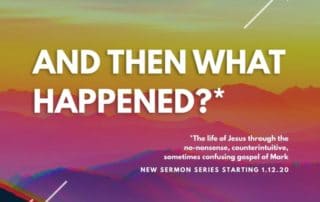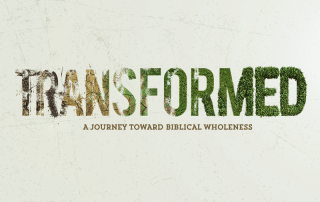And Then What Happened? | Mark 6:1-11 | Week 6
TRANSCRIPT
AND THEN WHAT HAPPENED? Mark 6:1-11 Pastor Josh Suddath {1st Service}
{Manuscript—View video for complete content.} On the third day a wedding took place at Cana in Galilee. Jesus’ mother was there, and Jesus and his disciples had been invited to the wedding also. When the wine was gone, Jesus mother said to him, “They have no more wine.” “Dear woman, why do you involve me,” Jesus replied, “my hour has not yet come.” Jesus mother said to the servants, “Do whatever he tells you to do.” Nearby stood six stone water jars, the kind used by the Jews for ceremonial washing, each holding from twenty to thirty gallons. Jesus said to the servants, “Fill the jars with water;” so they filled them to the brim. Then he told them, “Now draw some out and take it to the master of the banquet.” They did so, and the master of the banquet tasted the water that had been turned to wine. He did not realize where it had come from, though the servants who drew it out knew. Then he called the bridegroom aside and said, “Everyone brings out the choice wine first and then the cheaper wine after the guests have all had to much to drink, but you have saved the best until now.” This, the first of his miraculous signs, Jesus performed at Cana in Galilee. He thus revealed his glory, and his disciples put their faith in Him. (John 2:1-11)
I love this account in John’s gospel for two reasons. First for what it says about Mary and her strength. Mary was a young woman when she had Jesus, but she isn’t young anymore. And like many of you in this room who have had children, Mary’s word to Jesus is, “I brought you into this world, and I can take you out of it.” She knows the power he holds. And when Jesus balks at his mother’s request for more wine, Mary forces the hand of God.
Secondly, I love this account for what it says about the servants. Given the opportunity to hear the voice of God, to do what He told them to do, and then to know where the wine came from. When they bring the wine to the master of the banquet, the text says, the master did not know where it had come from, but the servants who drew it out, they knew. This was first of the Spirit’s public demonstrations of Jesus miracle working power.
And as we continue our series in Mark 6, a quick note about what we will cover today. We’re only going to look at Mark 6:1-11. If you want, by all means, go ahead and read the other three stories in this chapter. Let me sum them up for you. Two of them involve a platter—one holding five loaves and two fish by which Jesus feeds five thousand, and the other holding the head of John the Baptist, by which an angry woman feeds her pride. And then Jesus walks on water.
In Mark 6, we find Jesus returning to the place where he was raised, Nazareth, for the first time since his earthly ministry has started. Nazareth is eight miles from where the wedding at Cana took place. That’s from here to the Hogback. When Jesus returned to Nazareth, it must’ve been midweek, because the text seems to indicate that there are a few days before the Sabbath came, which is Friday at sundown to Saturday at sundown. When the Sabbath comes, and people are off of work and going to the synagogue, when crowds would’ve been present, Jesus begins to teach.
And we can notice from the nature of the questions that follow, that something felt different to the people gathered. “Where did this man get these things?” they asked. “What’s this wisdom that has been given him? What are these remarkable miracles he is performing?” Whether Jesus had made any small demonstrations there, or whether the wind had blown far enough that the Nazarenes had heard of Jesus miracles in other cities—we aren’t told what was said or what was done—but we’re told people recognized it as wisdom and remarkable and they were amazed. And they recognized him right off the bat. Isn’t this the carpenter? Those were the hands of a blue-collared teenager from their town. The hands that had fixed some of their stables and maybe even built a few of their dinner tables.
As they think back to Jesus’s teenaged years, they become a little bit agitated that this kid from their town would now speak to them with authority. Several of them were probably much more thoroughly trained than He was, so they begin to mock him. As they begin to mock him, they were faced with a dilemma. They couldn’t seem to easily bring to mind a time when he screwed up as a teenager. Nothing that every hurt anybody at least. There wasn’t much to poke at. So they do what anyone does who has no ammo—they went after his mom. Isn’t this Mary’s son? Certainly we’re told the full story with Mary, of the immaculate conception, and the virgin birth, but this text and others in scripture seem to indicate that people in that day either didn’t know or didn’t believe that part of the story. They saw Jesus as the son of Joseph and Mary. And they don’t even mention Joseph. So this is an underhanded dig at Mary and at Jesus. “Aren’t you the brother of James, Joseph, Judas and Simon? Aren’t your sisters right here? They’re all pretty normal human beings. What makes you any different?” And Jesus, knowing their hearts, responds, not with thunder from heaven, but with a universal truth that pierces the hearts of the people gathered, and might just pierce ours. A prophet is not without honor except in his own town, among his relatives, and in his own home.
And you and I wonder how in the world they could be so blind, deaf, and rude? This was the son of God they mocked. And yet we’ve done the very same things him. We’re the hometown. Corporately and individually, we become inoculated by our culture and we’ve lost our sense of anticipation of seeing the Spirit work. We’re the master of the banquet who doesn’t know where the wine has come from. Or maybe we’re so drunk that we fail to see the Spirit moving. Maybe that’s why the scriptures say don’t get drunk on wine, but rather be filled with the Spirit. And when we mock Jesus in this way, we also often mock the ones in whom His spirit resides, sometimes the people closest to us.
When was the last time someone close to you went away for a while? Maybe for a year, maybe off to college, maybe just a mission trip or a retreat. Here’s what may have happened. They came home, and in the first few days of being home, they did something, or said something remarkable….something unexpected and something that proved some significant spiritual growth. And you mocked them. You didn’t do it intentionally. It’s your default. You’ve seen them screw it up so royally that when you see the Spirit do something amazing in them, at best you question it, and at worst you fail to see it altogether. We dismiss it and without knowing just what we’ve done, we’ve simultaneously preached a false gospel to our loved ones and we’ve given the enemy a foothold.
I know a young man who went away to college and this very thing happened. God did something radical in him. He came back and he looked different. He had a zeal for Jesus that I hadn’t seen before. He wanted to share with me some scriptures he was learning and excited about. This was at the beginning of Christmas break. And then what happened? He hung out with his old friends from high school and some of his extended family members, and this zeal for Jesus wasn’t met with the same kind of encouragement that he had hoped for. I saw the young man after Christmas break and he looked like he’d just gotten out of the ring. He said, “I just don’t know what happened.” He shared that the enemy had had a hey-day over his life over that break.
A prophet is not without honor except in his own town, among his relatives and in his own home. Sometimes without knowing it, the gospel that we’ve preached to those people we love the most is ‘something like that could never come from someone who’s screwed it up like you have.’ We’ve said to those closest to us, God chooses to use the strong things of the world, the ones who have it together, the pure, the wise, and the polished people.
And God says to us, “I chose the foolish things of the world to shame the wise, the weak things of the world to shame the strong. I chose the lowly things of things and the despised things and the things that are not to nullify the things that are.” Because if it was the other way around we’d beat our chests and show everyone the number on our jerseys, but if it’s this way, our only recourse is worship. The next time the Spirit shows his work, show your worship. When you see Him working, or moving, or speaking in someone you love, encourage it, pour gasoline on that fire. Paul says it like this to the church in Thessalonica: Don’t put out the Spirit’s fire. Don’t treat prophecies with contempt, but test them all; hold on to what is good, rejecting all that is evil. (1 Thess. 5:19-21)
In one of my favorite Jerry Seinfeld stand-up routines, he impersonates the flight attendant who stands at the barrier between first class and economy and gives you that look. “If only you had worked a little harder.”
At first glance, this seems to be what Jesus is doing to his hometown of Nazareth. The text says: He could not do any miracles there, except lay his hands on a few sick people and heal them. I think the verse, in and of itself, is kind of funny. He couldn’t do any miracles there, except the ones he did. This begs the question, could He do miracles there? I bet half the people in this room would say, “Absolutely, He’s the Sovereign God of the universe. He can do whatever he wants.” He’s not limited by human beings. The other half of this room might say, “No, the text said he couldn’t do any miracles there, so that must be what it means. He was limited in some capacity, obviously.” I wonder if it might not be a little bit of both. Maybe he is limited but not by what we see in this verse. Maybe he’s not limited just because of their lack of faith. Maybe God’s limited in this moment with his hometown because He’s so committed to his character and to the unraveling of his kingdom, that when He’s presented with this moment of the lack of faith of the people He knows the best—He came to that which was his own and his own didn’t receive him. He loves them so much that he withholds the full measure of his blessing and his healing in that moment because he knows he has something better for them. Sometimes what looks to us like the judgment of God is actually his mercy. So often we want mercy in the giving from God, but we get mercy in the withholding. In Nazareth, Jesus withholds the full measure of his healings, and miracles in his hometown because knows it’s these “things” that the people are fixated on. In a place where people are failing to see WHO it is behind the WHAT. They proved it with their questions in the beginning of this text: Where did this man get these things? So, by withholding the full measure of his gifts, he’s giving Nazareth a chance to wrestle with the person they’ve just encountered. That’s mercy. I wonder this morning, what is it that God is withholding from your life right now? The thing that’s just eating away at you, and that He would have you wrestle with himself.
So Jesus’s time in Nazareth comes to an end and he moves on from village to village, meanwhile calling twelve disciples to himself, gives them authority and sends them out to do what he’s doing. These were his instructions: “Take nothing for the journey except a staff—no bread, no bag, no money in your belts. Wear sandals but not an extra shirt. Whenever you enter a house, stay there until you leave that town. And if any place will not welcome you or listen to you, leave that place and shake the dust off your feet as a testimony against them.”
While this seems like a list of directives to his disciples, Jesus is not giving a list of rules that will cause their mission to fail if broken. He’s not giving a mandate that should be followed by all future missionaries. He’s not calling all of his followers to a life of poverty. He’s making a statement about his kingdom. He’s using language that would’ve made his disciples scratch their heads and think, “Where have I heard that before?” That’s right—the stories from Egypt. Exodus 12:11 when God is instructing his people on how to observe the very first Passover meal in Egypt. These were the directions. This is how you are to eat it: with your cloak tucked into your belt, your sandals on your feet and your staff in your hand. Eat it in haste. Because the Israelites were about to go on a journey to a new land, new hope, and new life. By using this language in Mark 6, Jesus is telling his disciples, “I’m inviting you and giving you authority and power to invite the people around you on a new kind of exodus. A new journey into a new land with new life and new bread to eat…..and it’s me.” In John 6:33, Jesus says: For the bread of God is the bread that comes down from heaven and gives life to the world.
“Sir,” they said, “always give us this bread!” Then Jesus declared, “I am the bread of life. Whoever comes to me will never go hungry.” And in that moment, the Jews who were with Jesus did the same thing that the people in Nazareth did…they began to mock him. Isn’t this Jesus, the son of Joseph, whose father and mother we know? How can he say, I came down from heaven? All too often all we can see is humanity, when Jesus is showing us heaven.
Mark’s message is the same as John’s—God’s Spirit is at work, but there are some of you who just don’t see. Quick note to those of you who may be in here this morning and you’re struggling to see or hear Jesus……get out. I’m totally kidding! Isn’t that what you hear from the church pretty often? We see and you don’t; we know and you don’t; we get it and you don’t so if you’re not there, just get out. Jesus would warn us to be careful if you think you stand, lest you fall. The man who thinks he knows something does not yet know as he ought to know and right now you only see dimly through a glass. There’s nobody sitting in this room that sees clearly. If you’re here and you’re struggling to see God and hear from Him….lean in! Ask. Seek. Knock. Cry. Get mad. To be balanced, if you’re a person who’s pushing against the goads and you’ll have nothing to do with it, the truth should’ve been reaching out to you and they’ve been extending their hand for a while. Maybe you’ve taken what they give you because things are fun, but you don’t want to listen to anything else, don’t be surprised if the church moves on. At least for a season. Because there’s something in this passage from Jesus that seems to say to his disciples that if no one’s going to listen to you or welcome you, shake the dust from your feet and move on. In other words, if it starts to rust, shake the dust! If God is working in you and through you, don’t let the blindness and deafness of others slow you down.
Jesus’s statement to his disciples may have been part euphemism, but he may have actually wanted them to literally do it. He may have been reminding them that the feet of those who bring the good news are actually quite beautiful. Don’t miss the irony that Jesus chooses one of the ugliest parts about us to remind us how beautiful we are.
Jesus’s words to the servants at the wedding are his words to us. Just fill the jars with water. You’re the jar. He’s the water. And when we do, people around us will begin to ask the same questions they asked of Jesus,
“Where do these people get these things?” You and I then have the opportunity to tell them where the wine came from. But we have this treasure in jars of clay to show that this all-surpassing power is from God, and not from us.
One of these precious jars of clay, a friend of my family, passed away this week. She was, as I observed from afar, a woman who lived a life expecting her Jesus to move and expecting him to speak. Her name was Robin. Robin lived 50+ years with down syndrome. Somewhere along the line Robin developed a friendship with Joni Erickson-Tada through Joni’s work with the disabled community in her Joni and Friends summer camps. The story goes that one of Joni Erickson Tada’s representatives called Robin after a few years of Robin attending their camps as a camper. “Robin, we have an exciting opportunity for you. This year we’d like you to be a counselor at Joni and Friends and lead other campers. Is that something you’d like to do?” The representative heard no immediate response. Instead she recalled hearing the phone set down on the table on the other end of the line. Then, in the background, she heard Robins’ voice, “Jesus, do you want me to be a counselor at Joni and Friends this summer?” Then a pause. Then this. “Sounds good, Jesus.” And she picked up the phone and said “Jesus told me I’m in.” Robin was a servant who knew where the wine came from.
Let’s pray. Heavenly Father, I love that song—we came here with nothing, but all that you’ve given us, Jesus, bring new wine out of us. Lord, we need you. Fill us with your water. In Christ’s name. Amen.







